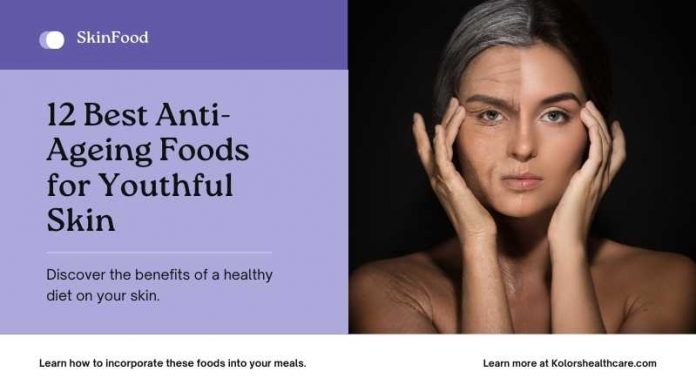If you want to reverse your skin’s ageing process, start by replacing fast food and junk food with skin-friendly options. Though skin serums and anti-ageing creams can work to some extent, nutrient-rich food is the only way to achieve young and radiant skin. Certain foods packed with antioxidants and healthy fats can revive your skin by kindling your skin’s anti-ageing ability internally. However, these anti-ageing foods are not the elixir of youth that restores your teenage skin. These foods will promote elasticity and enhance the glow while keeping wrinkles and sagging at bay. So, gorge on the best anti-ageing foods that give your skin a healthy glow and suppleness. Read on to learn about the anti-ageing foods that make your skin look plumper and younger.
How Certain Foods Can Promote Youthful Skin
Dieting alone will not help you stop the ageing clock. But, specific foods loaded with anti-inflammatory and antioxidants will help in slowing down the ageing process, boost collagen, and protect against skin damage [1]. However, do not expect results overnight because eating healthier and supplementing your skin with essential nutrients is a long-term process. Making slight changes to your diet will help replace the lost collagen necessary to optimize skin elasticity. Consuming anti-ageing foods regularly will help prevent ageing caused by loss of collagen [2] due to smoking, sun exposure, pollution, and drinking. Even if factors like genetics, low water intake, lack of sleep, and stress affect your skin health, consuming anti-ageing food items will help make a visible difference.
Top 12 Anti-aging Foods for Young-Looking Skin
The diet you consume is closely related to your skin health. This explains why you must incorporate anti-ageing foods to slow down the signs of ageing. It is always best to begin early with some of the best anti-ageing foods listed below to optimize your skin health.
I) Fruits and Berries
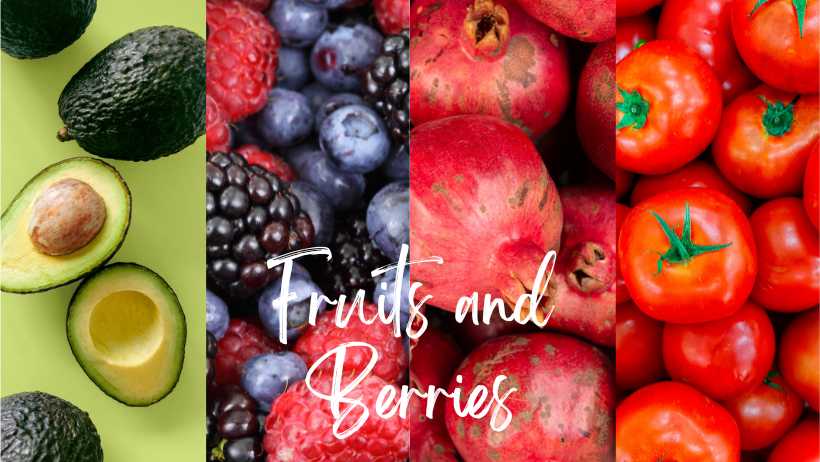
1. Avocado
Avocado is an anti-ageing superfood that is loaded with a distinct combination of nutrition and phytochemicals [3]. With their origin in Central America and Mexico, avocados are a great choice for preventing and treating degenerative stress and oxidative stress related to ageing. It also helps prevent cardiovascular issues, inflammatory and microbial conditions, diabetes and cancer. This fruit is abundant in fibre, prebiotic fibres and protein to improve overall health [4]. Plus, avocados have the right mineral levels, like high potassium and low sodium, to regulate blood pressure levels.
2. Berries
Including berries like blueberries, strawberries, raspberries, and strawberries with anti-ageing properties will be beneficial in enhancing skin health. The skin of the blueberries is rich in a pigment called anthocyanins, which is also a powerful antioxidant. Berries are known to lower inflammation and oxidative stress, which are responsible for causing signs of ageing. Whether you use freeze-dried, fresh or frozen blueberries, the polyphenols in them keep away Alzheimer’s disease, memory loss, cancer, and cardiovascular issues [5], Type 2 diabetes, and memory loss[6].
3. Pomegranates
Pomegranates are loaded with healthy nutrients [7] like vitamin K, potassium, and fibre to support your overall health. They are full of antioxidants like lignans, phenolic acids, tannins, and flavonols, which are essential for skin health [8]. Several studies have revealed that the antioxidants [9] present in pomegranates help enhance skin health by lowering the damage caused by UV rays [10] and brown spots due to sun exposure. These powerful antioxidants help protect the collagen levels in your body and help in improving your skin’s ability to produce collagen [11].
4. Tomatoes
Tomatoes are known to possess high levels of lycopene content, making them an effective anti-ageing food [12]. Lycopene, a form of carotenoid, gives it the red tint and also serves as an antioxidant to cut down the risk of developing chronic medical conditions [13]. A study showed that women who consumed an antioxidant-loaded drink with lycopene, vitamins E and C, fish oil, and soy isoflavones experienced lower wrinkle depth after 15 weeks [14]. You can also pair tomatoes with avocados or olive oil to enhance your body’s ability to absorb lycopene [15].
II) Vegetables and Greens
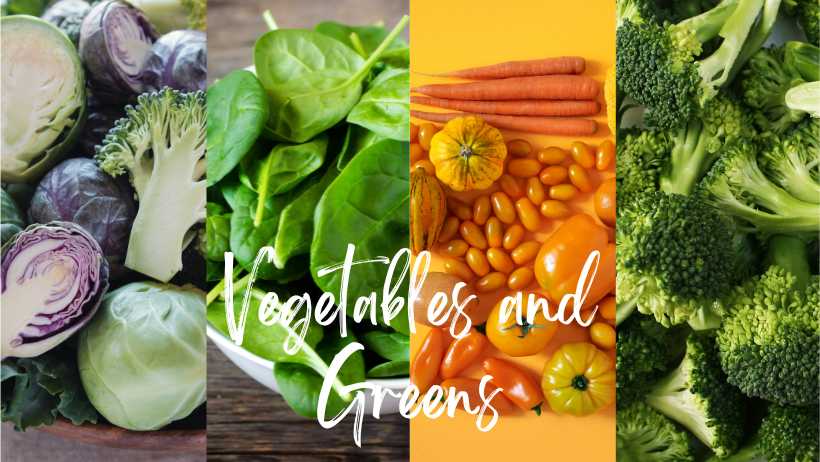
5. Cruciferous Vegetables
Whether it is Brussels sprouts, kale, cauliflower, cabbage, or broccoli, cruciferous vegetables are among the best anti-ageing foods as they are loaded with indole-3-carbinol to rectify high estrogen levels. Vitamins D and A in these vegetables protect your skin cells against photodamage and UV rays. They are loaded with phytonutrients essential for lowering inflammation and skin cancer. The natural compounds found in these vegetables, like vitamin C, phenolics, tocopherols, carotenoids and glucosinolates, help in activating the pathways of cellular detoxification to enhance your mineral levels [16].
6. Spinach
This super hydrating anti-ageing food contains antioxidants to replenish your whole body. This green leafy vegetable contains vitamins K, C, E, and A and minerals like lutein, heme-iron, and magnesium. This versatile superfood is rich in vitamin C to improve collagen production and maintain your skin’s smoothness and firmness. Vitamin A and K in spinach lowers inflammation at the cellular level and promote cell regeneration [17]. This nutrient-rich vegetable is rich in dietary fibre [18] and also contains calcium, iron, folic acid, and carotenoids essential for optimizing skin health.
7. Orange-coloured Vegetables
Consuming orange-coloured vegetables such as carrots and pumpkins will help you have young skin even as you age, as it is abundant in vitamin A called beta-carotene [19]. It is a vibrant carotenoid that gives the vegetables its orange and yellow colour[20]. These vegetables also contain beta carotenes to improve your skin’s ability to stay protected against UV rays. The beta carotene also doubles up as anti-ageing and antioxidant ingredient to enhance your skin’s rejuvenating prowess. These vegetables are the ideal choice as anti-ageing foods, as they slow down the ageing process and shield against environmental stressors, such as smoking, pollution, and UV rays [21].
8. Broccoli
Broccoli is an abundant source of nitrates that possess excellent anti-ageing properties and can enhance blood circulation levels in your body [22]. This nitrate-rich vegetable helps your body to hike the production of nitric oxide, essential for slowing down ageing [23]. So, the nutrients and oxygen are circulated smoothly to various parts of your body. It is also rich in antioxidants, which counteract the nitrosamine production in your body. This cruciferous vegetable contains a high dose of vitamin C to enhance collagen production and prevent the effects of free radicals. It also contains sulforaphane known for possessing anti-cancer properties, promoting skin health and lowering inflammation [24].
III) Nuts and Seeds
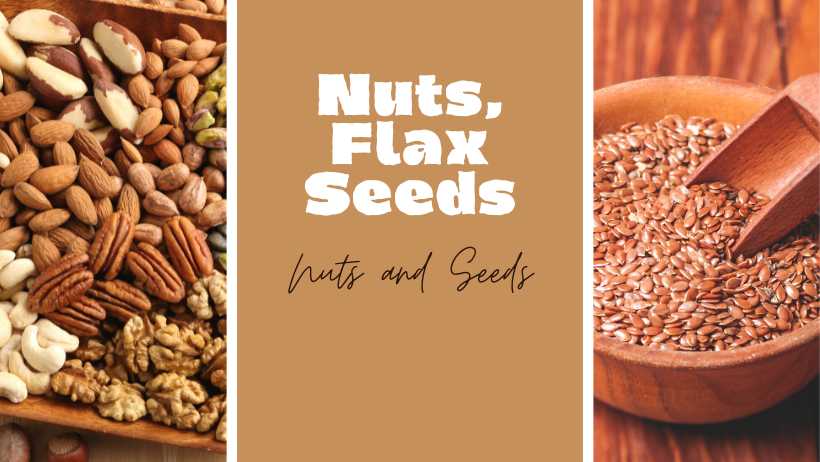
9. Nuts
Nuts are one of the top anti-ageing foods that are a staple addition to the Mediterranean diet. It includes legumes like peanuts, pistachios, almonds, walnuts, cashews, hazelnuts, and Brazil nuts. These nuts contain phytosterols, antioxidants, minerals, vitamins, fibre, protein, and healthy fats. Though high in calories, moderate consumption of nuts will not cause weight gain. Even people with type 2 diabetes can consume nuts like almonds to lower blood glucose levels and improve satiety [25]. Eating nuts as a part of your diet will lower bad cholesterol, enhance cognitive health, improve good cholesterol, lower cancer risks, and fight away inflammation to optimize your organ functions and skin health [26].
10. Flax Seeds
These small and hard seeds are one of the best anti-ageing foods that are rich in omega-3 fats like ALA or alpha-linoleic acid, fibre, and lignans, making it a perfect food for people having Type 2 diabetes [27]. The presence of ALA in flax seeds is known to enhance skin health by smoothing and hydrating the skin to lower the signs of ageing [28]. Besides improving your skin health, it also benefits your heart, prevents breast cancer, and regulates hormones, as it contains non-steroidal phytoestrogens. You can consume flax seed in any form: ground, meal, oil or whole. Consuming it after grinding will help in quick absorption by your gastrointestinal tract. Consume at least 2 tablespoons of flax seeds daily to have young-looking skin.
IV) Herbal Teas and Beverages
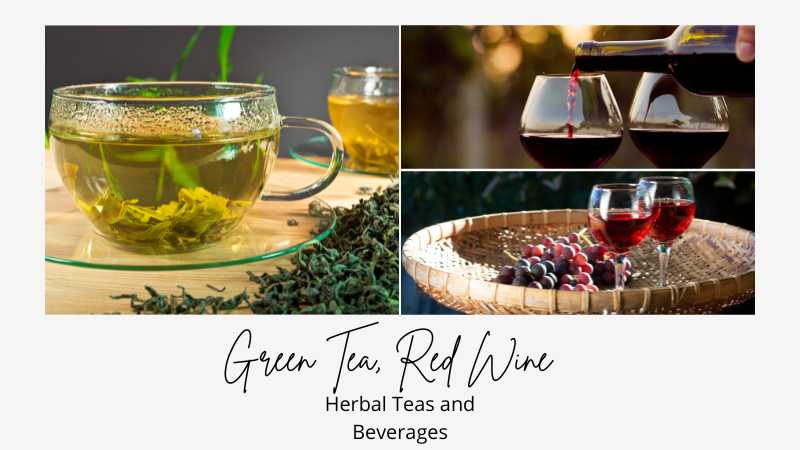
11. Green Tea
Green tea is one of the world’s most highly consumed beverages after water. Green tea is obtained from the plant called Camellia sinensis. It is finished in various forms, such as black, oolong, and white. It is high in beneficial compounds called polyphenols, especially EGCG [29] or epigallocatechin-3-gallate, known for its anti-ageing properties [30]. Studies show that consuming about 3 cups of green tea per day is beneficial to prevent all types of cancer. It also contains the risk of developing neurological diseases, cardiovascular disease, and Type 2 diabetes. Regular consumption of green tea will help you benefit from its antioxidants to keep away the effects of oxidative stress and inflammation [31].
12. Red Wine
Red wine is a well-known anti-ageing food that contains a powerful agent called resveratrol, which helps in the activation of sirtuins proteins responsible for anti-ageing [32]. It enhances the production of SIRT1 protein to protect your body against damage. The polyphenolic flavonoid found in the skin of red grapes used in the preparation of red wine belongs to a group of phytoalexins. These molecules defend your body against pathogen stress and UV radiation damage to protect the skin. Choose red wine prepared from the extract of Muscat, Malbec, Pinot Noir or Syrah grape varieties with concentrated resveratrol levels. However, ensure that you consume red wine in moderation to enjoy its anti-ageing benefits to the fullest [33].
Complementing Diet with Skin Care
Even though the skin is your biggest organ, you might not realize the significance of taking care of it unless it shows signs of ageing. The food inside your mouth is pivotal in enhancing your skin health. Pay attention to your diet by including many anti-ageing foods to achieve luminous and healthier-looking young skin. Including a lot of hydrating fruits, green leafy vegetables, nuts and seeds, probiotics, and herbal teas as a part of your everyday diet will help achieve younger-looking skin. Choose healthy foods loaded with zinc, Vitamins A, C, E, and K, omega-3 fatty acids, and antioxidants to keep the signs of ageing at bay. Avoid packaged and processed foods loaded with sugar, fats, and artificial ingredients, as they can promote ageing and worsen skin health. Stay hydrated, drink lots of water. Include green tea and fruit juices to slow down signs of ageing.
References
- Vivien W. Fam, PhD, RDN, Prae Charoenwoodhipong, MS, Raja K. Sivamani, MD, MS, Roberta R. Holt, PhD, Carl L. Keen, PhD, Robert M. Hackman, PhD – https://www.jandonline.org/article/S2212-2672(21)01433-7/fulltext
- School of Public Health, Harvard.edu – https://www.hsph.harvard.edu/nutritionsource/collagen/
- NICM Health Research Institute, Western Sydney University, Penrith, NSW 2751, Australia – https://www.mdpi.com/2076-3921/8/10/426
- Plant Science Laboratory, Cranfield University, Bedfordshire MK43 0AL, United Kingdom – https://pubmed.ncbi.nlm.nih.gov/19580285/
- School of Nutrition, Chung Shan Medical University, 110, Section 1, Jianguo North Road, Taichung 40201, Taiwan – https://www.mdpi.com/1420-3049/26/13/3904
- Department of Internal Medicine at Rush University Medical Center, Chicago, IL, USA – https://pubmed.ncbi.nlm.nih.gov/26086182/
- U.S. DEPARTMENT OF AGRICULTURE, Agricultural Research Service – https://fdc.nal.usda.gov/fdc-app.html#/food-details/1102695/nutrients
- Laboratory of Oenology and Alcoholic Beverages, Department of Food Science and Technology, School of Agriculture, Aristotle University of Thessaloniki – https://www.ncbi.nlm.nih.gov/pmc/articles/PMC7074153/
- The Medical Research Center for Globalization of Herbal Medicine, Daegu Haany University, Gyeongsan, Gyeongsangbuk-do 38610, Republic of Korea – https://pubmed.ncbi.nlm.nih.gov/28810554/
- Center for Human Nutrition, David Geffen School of Medicine, Department of Medicine, Los Angeles, CA 90095 USA – https://www.ncbi.nlm.nih.gov/pmc/articles/PMC6787198/
- Livestock Product Processing Engineering and Technology Research Center of Yunnan Province, Yunnan Agricultural University, Kunming 650201, China – https://www.ncbi.nlm.nih.gov/pmc/articles/PMC7146365/
- – https://pubmed.ncbi.nlm.nih.gov/33668703/
- University Institute of Diet and Nutritional Sciences, Faculty of Allied Health Sciences, The University of Lahore, Lahore 54000, Pakistan – https://www.ncbi.nlm.nih.gov/pmc/articles/PMC7464847/
- Unilever R&D, Colworth Discover, Colworth Science Park, Sharnbrook, Bedfordshire, MK44 1LQ, U.K. – https://pubmed.ncbi.nlm.nih.gov/23927381/
- Division of Nutritional Sciences, University of Illinois Urbana Champaign, Urbana, IL 61801, USA. – https://pubmed.ncbi.nlm.nih.gov/33668703/
- Department of Agricultural Sciences, University of Naples Federico II, Via Università 100, 80055 Naples, Italy – https://www.mdpi.com/1420-3049/23/1/15
- USDA Human Nutrition Research Center on Aging, Tufts University – https://www.ncbi.nlm.nih.gov/pmc/articles/PMC3151653/
- Department of Food Engineering, Engineering Faculty, Ege University of Izmir, Turkey – https://pubmed.ncbi.nlm.nih.gov/24876314/
- Council for Nutritional and Environmental Medicine (CONEM), Toften 24, 8610 Mo i Rana, Norway – https://www.ncbi.nlm.nih.gov/pmc/articles/PMC9610014/
- Department of Fruit, Vegetable and Nutraceutical Plant Technology, Wrocław University of Environmental and Life Sciences, 37 Chełmońkiego Street, 51-630 Wrocław, Poland – https://www.ncbi.nlm.nih.gov/pmc/articles/PMC8070462/
- Intervention and Cell Therapy Center, Peking University Shenzhen Hospital, Shenzhen, Guangdong, 518036, People’s Republic of China. – https://pubmed.ncbi.nlm.nih.gov
- Jo Adetunji, Editor, The Conversation UK – https://theconversation.com
- National Cancer Institute – Division of Cancer Control and Population Sciences – https://progressreport.cancer.gov/prevention/nitrate/
- Departamento de Ciencias de la Salud, División de Ciencias Biológicas y de la Salud, Universidad Autónoma Metropolitana-Iztapalapa, A.P. 55-535, 09340 Mexico City, Mexico – https://www.ncbi.nlm.nih.gov/pmc/articles/PMC6885086/
- School of Nutrition and Health Science, Taipei Medical University, Taipei City 110, Taiwan. – https://pubmed.ncbi.nlm.nih.gov/20580779/
- De Souza, R. G., Schincaglia, R. M., Pimentel, G. D., & Mota, J. F. (2017). Nuts and Human Health Outcomes: A Systematic Review. Nutrients, 9(12), 1311. – https://www.mdpi.com/2072-6643/9/12/1311
- Parikh, M., Maddaford, T. G., Austria, J. A., Aliani, M., Netticadan, T., & Pierce, G. N. (2019). Dietary Flaxseed as a Strategy for Improving Human Health. Nutrients, 11(5), 1171. – https://www.mdpi.com/2072-6643/11/5/1171
- K. Neukam; S. De Spirt; W. Stahl; M. Bejot; J.-M. Maurette; H. Tronnier; U. Heinrich, Skin Pharmacol Physiol (2011) 24 (2): 67–74 – https://karger.com
- Key Laboratory of Puer Tea Science, Ministry of Education, Yunnan Agricultural University, Kunming, China; Yunnan Research Center for Advanced Tea Processing, Kunming, China – https://pubmed.ncbi.nlm.nih.gov/28343910/
- Division of Pharmaceutical Sciences, College of Pharmacy and Pharmaceutical Sciences, Institute of Public Health, Florida A&M University, Tallahassee, FL 32307, USA – https://pubmed.ncbi.nlm.nih.gov/35327563/
- Academy of Scientific & Innovative Research, Dietetics & Nutrition Technology Division, CSIR-Institute of Himalayan Bioresource Technology, Palampur, India – https://www.sciencedirect.com/science/article/abs/pii/S0955286322001395
- Cardiovacular Research Center, University of Connecticut School of Medicine, Farmington, CT 06030-1110, USA – https://pubmed.ncbi.nlm.nih.gov/20238161/
- Freshage Research Group, Department of Physiology, Faculty of Medicine, University of Valencia, CIBERFES-ISCIII, INCLIVA, E46010 Valencia, Spain – https://www.ncbi.nlm.nih.gov/pmc/articles/PMC7920262/

